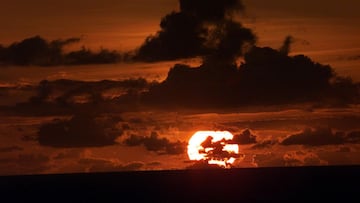Which countries have had no coronavirus cases?
Since the start of the covid-19 pandemic at the end of 2019, over two years ago, we have seen well over 300 million cases recorded. But have any nations avoided it?


Back in late 2019, little was known about a novel coronavirus that had been identified in Wuhan, China, but murmurs were that if it was to spread, it could become a national and potentially international problem. As we have tragically found out, it did, and changed the world that most of us inhabit. Two years down the line, and over 300 million confirmed cases later, some people are wondering whether any countries have actually managed to avoid being hit by the virus.
Covid-19: no country has escaped
According to Our World in Data, as of the 19 January 2020 there have been 334,101,607 cases of covid-19 recorded around the world, which has resulted in 5,554,786 related deaths.
You may also want to read:
- Omicron variant: latest covid news
- Does Omicron affect your lungs?
- Earth's sixth mass extinction has begun according to scientists
- How chemical pollution threatens species survival
With an acceptance that there are significant variations in testing and record keeping in different countries - as well as the size of the population - the highest number of cases have been captured in the United States of America (67.5 million), and they are followed by India (37.9 million), Brazil (23.2 million) and the United Kingdown (15.4 million).
Testing positive for having the virus is one thing, of course, and how serious the illness becomes for a patient is where a country’s health provisions and access to vaccinations is reflected. Peru is the country with most recorded deaths per million due to covid-19 (6,104), with Bulgaria, Bosnia and Herzegovina and Hungary next on the list.
But have any countries managed to lock out the virus and escape the pain that most others have been, or are still, going through? The answer, in its purest sense is ‘no’.
Tonga - the island in the news recently after an underground volcano exploded - and the Federated States of Micronesia have, at the time of writing, been the closest to doing so. Both nations have recorded just a single covid-19 case each, neither of which resulted in a death. The Cook Islands and Kiribati have seen two cases since the pandemic began, while Samoa has seen three. Of the countries that have had negligible impact, only Vanuatu has lost someone to the virus, one of out the seven cases discovered.
Covid-19: what’s the current global situation?
On Wednesday, the chairman of the Gavi vaccine alliance, Jose Manuel Barroso, said that an additional $5.2 billion is needed to continue to deliver covid vaccines at scale, as more than 3 billion people in the world have yet to receive their first dose. Find out which countries are currently on track to reach global covid-19 vaccination targets.
Covid across Europe
Betting Omicron cases have peaked, British Prime Minister Boris Johnson dropped COVID-19 rules in England, as he faces a revolt by his own lawmakers who are angry over a series of lockdown parties in Downing Street. The Hungarian opposition's candidate for prime minister said he was isolating after testing positive. Portuguese voters with covid-19 and those in isolation will be allowed to leave home to cast their ballot when the country holds a snap election on Jan. 30.
Update: Switzerland now reports deaths by booster status.
— Edouard Mathieu (@redouad) January 17, 2022
Compared to unvaccinated people, the COVID mortality rate is:
• 9x lower after full vaccination
• 48x lower after a booster
[From our post with @maxcroser on death rates by vaccination status: https://t.co/EozbccWmuj] pic.twitter.com/ozWueyHO2k
Greece began imposing recurring fines on those over the age of 60 who are unvaccinated. The Czech government scrapped a decree making covid-19 vaccinations mandatory for key professionals and over 60s, while the daily tally of new cases hit a record high. Austria, Slovenia and Croatia also reported record new daily infections, but new cases and deaths fell in neighbouring Italy.
The European Commission will likely approve $1.93 billion state aid for Berlin airport to avoid its bankruptcy, sources told Reuters.
Covid across Asia-Pacific
The Indian drug regulator's subject expert committee recommended full approval for Covishield and Covaxin, the two covid-19 vaccines that have dominated the country's inoculation drive. Thousands of people in Hong Kong volunteered to adopt unwanted hamsters after the government's mass cull over covid-19 fears.
Covid in the Americas
Infections continue to accelerate in the Americas, reaching new peaks, with 7.2 million new cases and more than 15,000 deaths in the last week, the Pan American Health Organization said. Brazil and Mexico reported record new daily cases with 137,103 and 49,343 respectively.
The U.S. government plans to make 400 million non-surgical N95 masks from its stockpile available for free to the public starting next week. The Federal Trade Commission ordered U.S. marketers to immediately stop making false claims their products can prevent covid-19.
Covid across Africa and the Middle East
Algeria has decided to close its schools for 10 days after it registered a rise in Omicron cases. South African-American businessman Patrick Soon-Shiong opened a new vaccine plant in Cape Town, intended to help his local NantSA company make covid-19 shots in future and address the continent's deadly dearth of manufacturing capacity.
NEW: We now have daily-updated charts for the UK, Israel, and Spain, to compare key COVID-19 metrics to previous waves.
— Edouard Mathieu (@redouad) January 10, 2022
In this new post, I explain why they're so useful in monitoring the protection that vaccination provides against severe outcomes. https://t.co/PM1kDKhnxa
Covid and medical developments
French biotech firm Valneva said preliminary studies had shown that three doses of its inactivated vaccine candidate neutralised the Omicron variant. Swiss medical researchers said they have launched an early-stage study to test a next-generation vaccine candidate which would be administered via an arm patch.
Tennis champion Novak Djokovic has an 80% stake in Danish biotech firm QuantBioRes, which is aiming to develop a medical covid-19 treatment, its CEO told Reuters.
Covid’s impact on economies
Related stories
Strong U.S. and European corporate results helped stock markets initially rebound on Wednesday from the prior day's sell-off, but rising crude prices kept inflation concerns alive even as bond yields eased after they touched fresh multi-year highs.
Argentina's Vice President Cristina Fernandez de Kirchner slammed payments to the International Monetary Fund as costing the country more than covid-19, as talks over a new $40 billion deal show little sign of advancing. A group of more than 100 billionaires and millionaires said the ultra-wealthy were not currently being forced to pay their share of the global economic recovery from the pandemic.

